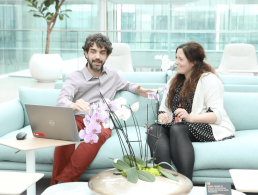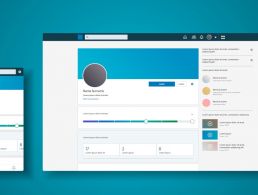It’s like ‘developing a puzzle’. Rosemarie Leone tells SiliconRepublic.com about what life is like on the IT team at the European Space Agency.
IT and space exploration are two of the world’s most tech-orientated and fast-moving sectors to work in. Combine them and you’re bound to be facing a challenging career, albeit a career like no other.
The European Space Agency (ESA) recently ran a careers week, during which time it put a spotlight on its IT team. Some people from the team featured in a short video talking about their jobs, which piqued our interest.
To find out more about what it’s like to work on ESA’s IT team, SiliconRepublic.com spoke to Rosemarie Leone, who is a senior team member.
Leone’s job is “challenging,” but also rewarding and very interesting. It’s constantly evolving depending on the needs of the team and its clients. She has to be very adaptable.
As she explained, she recently changed job titles from IT infrastructure project manager to applications division manager.
Her job is still broadly similar to what it was, but she’s focusing a lot more on developing new applications for ESA customers now. She has to be up to date with ESA’s tech in order to explain what it can do for clients depending on what their requirements are.
When she’s looking for people to join her team, she wants “curious people” with a “system view”. The latter is important for an IT person because every single ESA application is integrated and needs to be interoperable with the others.
It also helps to be good with dealing with customers, as that is a big part of Leone’s job. It’s up to her not only to stay on top of the current tech trends and what clients want, but to ensure return on investment.
She described balancing all these different challenges as like “developing a puzzle”. It’s a puzzle that requires lots of different skills, both soft and technical. According to Leone, the whole IT team is very supportive of each other for this reason. “It’s very much about sticking together,” she said
If there is a complaint, it’s usually for the IT team, she joked, which makes them a very close-knit bunch. “We do defend each other. I never felt isolated even in a situation where things really go wrong.”
Leone said that throughout her career at ESA she has always been able to rely on either her managers or her colleagues to step in and help or advise her if she needed it.
As senior staff, she is now a mentor to younger staff members who join the team. She takes the most challenging projects in order to shield some of the less experienced team members from burnout.
It’s also a good way to teach newer staff how to do things “without them being exposed”. The IT department is particularly flexible in that it allows teams to divide the work among themselves.
“The IT department offers you an incredible amount of opportunity in creating your own career and professional skills. You can be trained in whatever area you believe is important,” said Leone.
“You have a lot of freedom… If you are more a person that would really like to work with advanced technology, the IT department will give you the opportunity to do so. If you are more comfortable with traditional approaches, this is something that you can also choose.
“There is the possibility for you to grow in whatever direction.” Some staff choose the technical route, others choose a more managerial direction. Team members use skills ranging from data analysis to natural language processing.
According to Leone, it is a dynamic work environment. There’s a high “turnover of personnel”.
“It’s a department that really welcomes younger people, new people and new ways of working.” Leone said she is lucky in that she can opt for a hybrid work model, as can many of her team depending on their individual roles.
On the day she is speaking to SiliconRepublic.com, she is working out of ESA’s Italian base because she is working on a “difficult task that requires integration” with her colleagues.
The challenge will be worth it in the end, she said. Throughout her career she has been consistently rewarded by ESA, both in terms of promotions and salary increases. As an employer, the organisation uses what Leone referred to as “smart working” or a way of working that allows employees to measure their own success and be accountable for their own work.
“At the end of each year, you are assessed against your own objectives,” rather than being directly reliant on an authority figure or “controlled in the office”.
If Leone’s career sounds like it’s up your alley (or in your orbit), see the current vacancies on ESA’s careers website.
10 things you need to know direct to your inbox every weekday. Sign up for the Daily Brief, Silicon Republic’s digest of essential sci-tech news.




